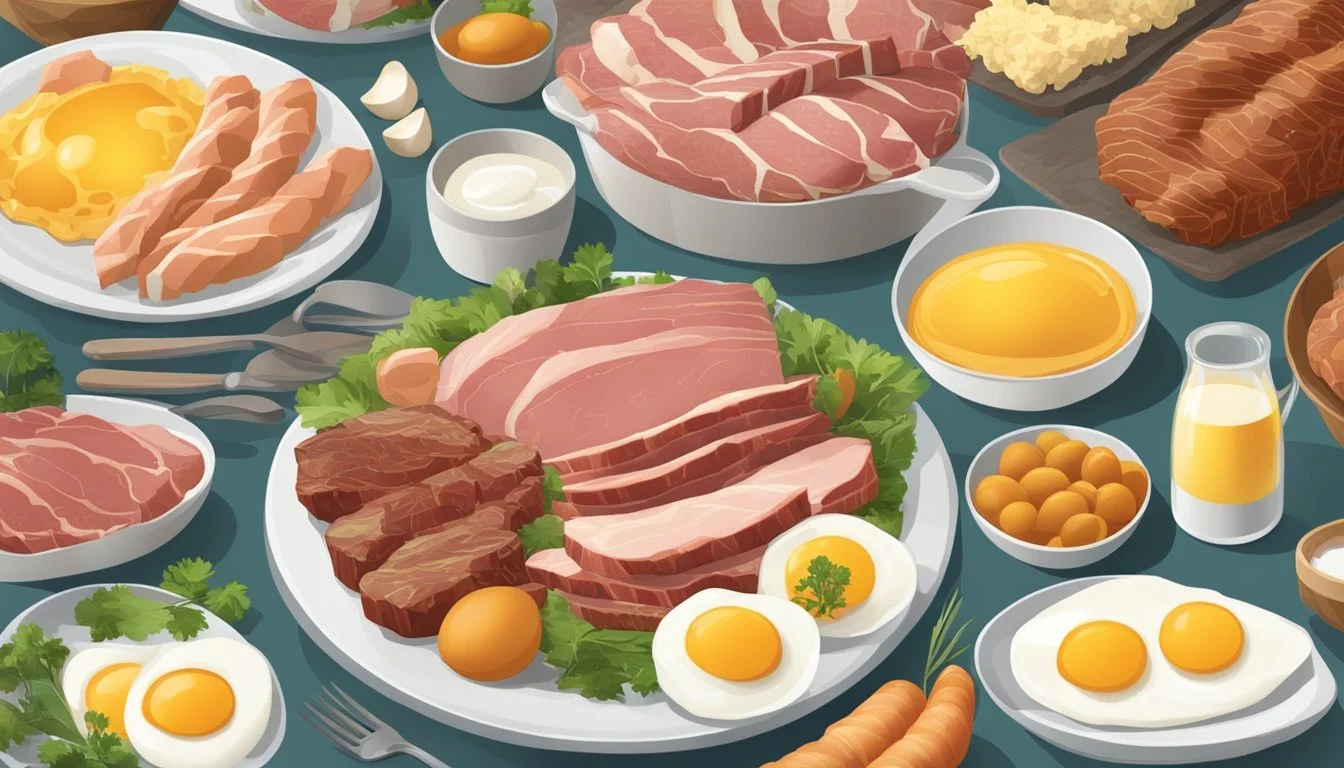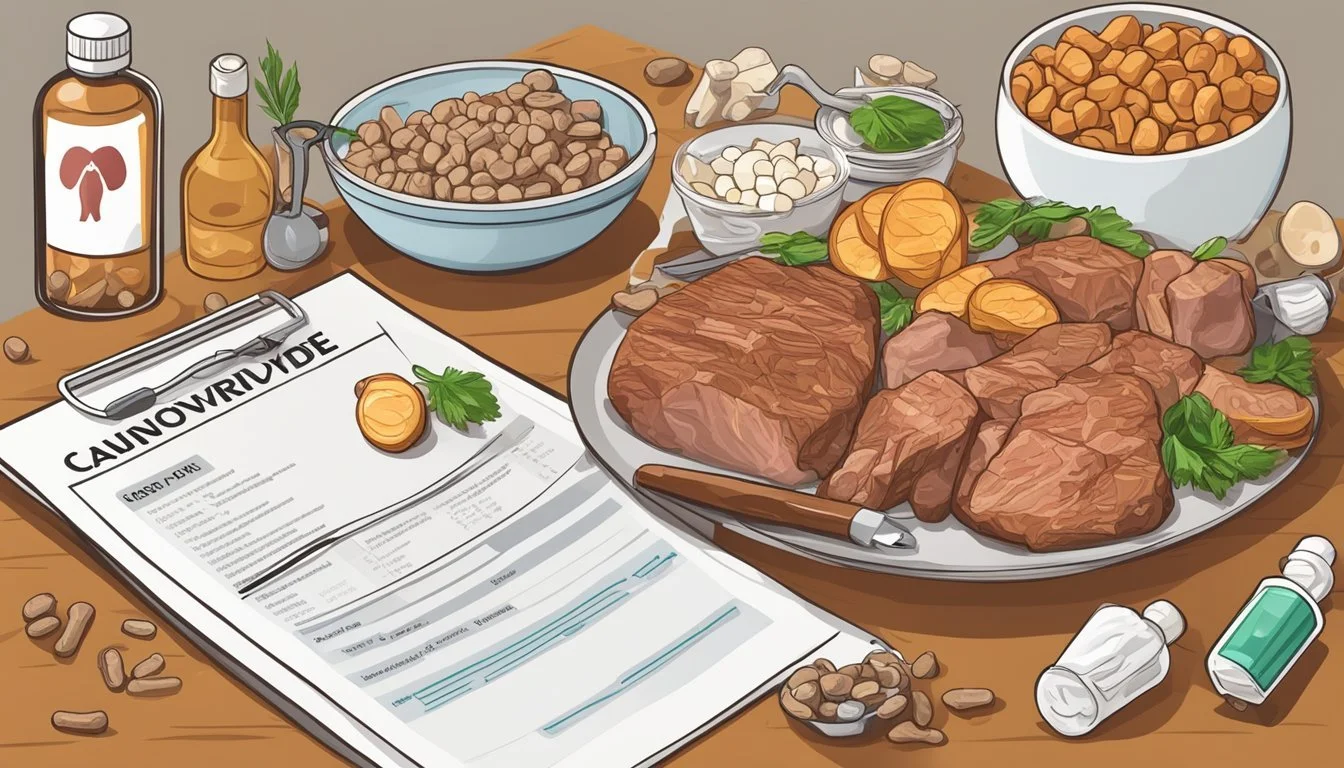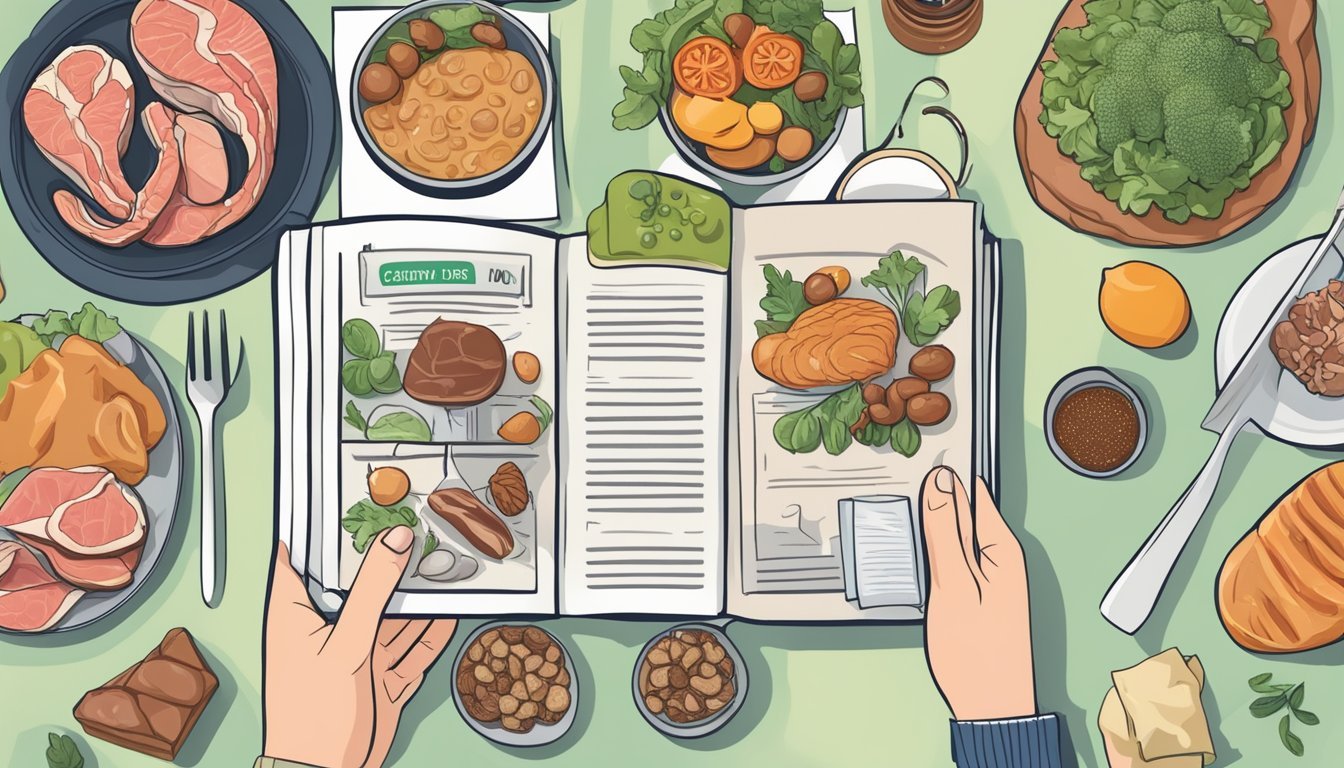Carnivore Diet Kidney Stones Risk
Understanding the Connection
This Article is Part Of Our Guide on the Carnivore Diet
The carnivore diet, as its name suggests, focuses on the consumption of animal products and excludes plant-based foods. Advocates of this diet suggest that animal fats, proteins, and micronutrients are sufficient for maintaining health, positing that carbohydrates and plant products are not essential. While some individuals report experiencing health benefits on the carnivore diet, there is a potential risk for kidney stones, especially in those with a predisposition to renal issues.
Kidney stones are hard mineral and salt deposits that form in the kidneys and can cause significant pain and discomfort. They are influenced by various dietary factors, including the intake of animal protein. A high intake of animal protein, as seen in the carnivore diet, may increase the risk of stone formation by raising levels of calcium and uric acid in the urine, which are common components of kidney stones.
Kidney health is a critical aspect to consider when adopting any new diet. It is important to balance the nutritional benefits with potential risks. Given that the carnivore diet may elevate the risk of kidney stones due to its high oxalate content, those with kidney stones or kidney disease are generally advised to avoid this dietary approach. Maintaining proper hydration and considering the overall balance of one's diet can play key roles in supporting kidney health and reducing the risk of stone formation.
Understanding Kidney Stones
Kidney stones are hard mineral deposits formed in the kidneys, and their study encompasses understanding their formation, types, risk factors, and methods of diagnosis.
Formation and Types
Kidney stones form when certain substances, such as calcium, oxalate, uric acid, and other compounds, become concentrated in the urine to a level at which they can crystallize. Two common types of kidney stones are calcium oxalate stones and uric acid stones.
Calcium Oxalate Stones: The most prevalent kind of kidney stone, which forms when calcium combines with oxalate in the urine. Inadequate calcium and fluid intake, as well as other conditions, can contribute to their formation.
Uric Acid Stones: These stones may form when the urine contains too much acid, a condition known as hyperuricemia. A high intake of purine-rich foods, such as certain meats and fish, can increase the level of uric acid in the urine.
Risk Factors
Several factors may increase the likelihood of kidney stone formation:
Hyperoxaluria: An excessive amount of oxalate in the urine can lead to the formation of calcium oxalate stones.
Diet: A diet high in salt and protein or low in calcium can promote stone formation.
Hydration: Chronic dehydration can lead to more concentrated urine, increasing the risk of stone formation.
Symptoms and Diagnosis
Symptoms of kidney stones can be severe and include:
Pain: Sharp pain in the back, side, lower abdomen, or groin.
Other Symptoms: Hematuria (blood in urine), nausea, or vomiting.
Diagnosing kidney stones typically involves:
Imaging: Techniques like CT scans and ultrasounds.
Urinary Analysis: Tests to detect signs of stones in the urine, like the presence of blood or crystalline substances.
The Carnivore Diet Overview
The Carnivore Diet is a dietary regimen that focuses exclusively on animal-based foods, emphasizing meat consumption and the exclusion of plant-based foods.
Dietary Composition
Meat (e.g., beef, pork, chicken)
Fish and seafood
Eggs
Limited dairy products, such as butter and certain cheeses
Excluded Foods:
Fruits
Vegetables
Grains
Legumes
Nuts and seeds
Potential Health Impacts
Proponents of the Carnivore Diet argue for benefits such as weight loss and blood sugar regulation. However, one should consider its nutritional completeness and the potential risk of high levels of saturated fat and cholesterol from excessive animal protein. The diet's high protein and fat content, particularly saturated fat, may have implications for kidney health, though individual responses can vary.
Nutritional Considerations and Kidney Health
Adopting a diet that supports renal function is essential, especially for those considering high-protein diets such as the carnivore diet. Understanding the impact of dietary components like protein, oxalate, and calcium, as well as the importance of fluid intake, is crucial for kidney health.
Protein Intake and Kidneys
High protein diets can increase the load on the kidneys, but for individuals with healthy renal function, a moderate increase in protein typically does not pose significant harm. However, excessive protein can exacerbate pre-existing kidney conditions. The carnivore diet, predominantly high in protein, should be approached with caution, balancing meat intake with adequate hydration to assist renal processing.
Role of Oxalate and Calcium
Dietary oxalate is a concern due to its potential to form kidney stones, especially in high quantities without sufficient calcium. Calcium can bind to oxalate, reducing the risk of stone formation. Contrary to intuition, dietary calcium may help prevent stones, as it binds to the oxalate in the gut, lowering its availability for stone formation in the kidneys.
High-oxalate foods to limit: Spinach, beets, potato chips
Calcium-rich foods to consider: Low-fat dairy, calcium-fortified alternatives
Importance of Fluids and Citrate
Hydration is a key factor in renal health, aiding in the dilution of urinary waste. A high fluid intake increases urine volume and can reduce the concentration of stone-forming substances in the kidneys. Citrate has a unique role in preventing kidney stones due to its ability to bind calcium and inhibit stone formation.
Hydration goal: Aim for at least 2-3 liters of water daily.
Citrate-rich fluids: Lemonade and other citrus juices can be beneficial.
Incorporating these nutritional considerations into one's diet is vital for maintaining optimal kidney function and overall health.
Potential Risks of Carnivore Diet on Kidney Stones
The carnivore diet, characterized by a high intake of animal proteins and the exclusion of plant-based foods, may impact kidney stone formation through altered urine chemistry and oxalate absorption.
Hyperoxaluria and Oxalate Absorption
Hyperoxaluria refers to the excessive excretion of oxalate in urine, a risk factor for kidney stone formation. The carnivore diet eliminates oxalate-rich foods, which seems beneficial; however, the lack of dietary calcium might increase intestinal oxalate absorption. Without plant-based foods, which typically bind oxalates in the gut and reduce absorption, the body may experience a higher concentration of urine oxalate.
Impact on Urine Chemistry
Changing dietary patterns, particularly those involving excessive animal protein consumption, can cause an acidic urine pH. High levels of uric acid may result from a meat-heavy diet, increasing the risk for urate stones. Additionally, an increase in calcium and oxalate excretion with reduced urinary citrate when on a high-protein diet can contribute to stone formation.
Influence of Animal Protein Intake
The intake of animal protein, a cornerstone of the carnivore diet, has been linked to an increased risk of kidney stones. Animal protein can raise levels of calcium and uric acid in urine, which may lead to the development of calcium oxalate and uric acid stones, respectively. Meat intake is known to increase the excretion of citrate, a substance that normally helps prevent stone formation by binding urinary calcium.
Dietary Approaches to Prevent Kidney Stones
To mitigate the risk of kidney stones, individuals are advised to follow specific dietary strategies, focusing on optimal fluid consumption and careful management of dietary elements such as calcium, oxalate, and citrate.
Fluid Intake and Diet Modification
Adequate fluid intake is crucial in the prevention of kidney stones. It is recommended to consume at least 2.5 liters of fluid daily to dilute the urine, thereby decreasing the chances of crystal formation. This should predominantly consist of water, but can include other beverages too. Adjustments to the diet can also play a substantial role in prevention. Reducing sodium and limiting foods rich in animal protein that may elevate uric acid levels are important steps.
Role of Dietary Calcium and Oxalate Management
Contrary to popular belief, calcium intake should not be too low, as it can bind to oxalate in the gastrointestinal tract, reducing oxalate absorption and its subsequent urinary excretion. Adults should aim for the recommended dietary allowance of calcium, through food rather than supplements. Foods high in oxalate such as certain vegetables and nuts may need to be limited to maintain normal oxalate levels.
Inclusion of Citrate and Other Supplements
Increasing the consumption of citrate is beneficial because it can bind to calcium in the urine, reducing the formation of stones. Citrus fruits, such as lemons and oranges, are good sources of dietary citrate. As for supplements, they should be taken with caution and ideally under a healthcare provider's advice, since some, like vitamin C, can potentially increase stone risk if taken in excess.
Comparing Dietary Patterns and Kidney Stone Risk
Dietary habits play a significant role in the risk of kidney stone formation. Different dietary patterns impact this risk in various ways, with specific food groups either increasing or decreasing the likelihood of stone development.
Carnivore Diet vs. Plant-Based Diets
The carnivore diet, which is predominantly high in animal proteins, may increase kidney stone risk because high meat intake is associated with higher excretion of calcium and oxalate, key components of most kidney stones. In contrast, plant-based diets are typically rich in fruits and vegetables, which can lower the risk. These diets provide a greater intake of nutrients like magnesium and potassium, which are known to inhibit stone formation.
Carnivore Diet: High risk due to increased calcium and oxalate.
Plant-Based Diets: Lower risk owing to protective nutrients.
Standard American Diet Influence
The Standard American Diet (SAD) often contains high levels of sodium, refined sugars, and animal proteins, all contributors to kidney stone risk. It typically lacks adequate amounts of fruits, vegetables, and whole grains which are crucial in maintaining a balance of minerals and reducing the chance of stone formation.
SAD Traits: High sodium, sugars, low in key protective foods.
DASH Diet Principles
The DASH (Dietary Approaches to Stop Hypertension) diet emphasizes the consumption of foods that reduce blood pressure, a factor linked to lower kidney stone risk. It includes an abundance of:
Vegetables
Fruits
Grains
Nuts, seeds, and legumes
These components encourage a balance of minerals like calcium and potassium while avoiding excessive animal protein intake, aligning with guidelines that suggest lowering the incidence of kidney stones. By emphasizing plant-based foods, the DASH diet supports renal health and potentially decreases kidney stone risk.
DASH Approach: Focuses on mineral balance, reduced animal protein.
Addressing Misconceptions About Diet and Kidney Stones
When considering the relationship between diet and kidney stones, it is essential to clarify common misconceptions surrounding protein intake, calcium consumption, and oxalate absorption.
Protein Myths
Myth: High-protein diets, especially those rich in animal protein, directly lead to kidney stones.
Fact: Moderate intake of protein, including animal protein, does not increase the risk of stone formation in individuals with no underlying risk factors. However, excessive consumption of meat can contribute to higher uric acid levels, which may contribute to stone formation in susceptible individuals.
Calcium Intake Confusion
Myth: Dietary calcium should be minimized to prevent kidney stones.
Fact: Adequate dietary calcium is critical in preventing kidney stones, as it binds to oxalate in the gut, reducing oxalate absorption. A balance is key; neither excess nor insufficient dietary calcium is advisable.
Include: low-fat or fat-free milk products
Avoid: Supplements in high doses without medical advice
Oxalate Misunderstandings
Myth: All oxalate-rich foods must be eliminated from the diet to prevent kidney stones.
Fact: While it's true that limiting intake of oxalate-rich foods can help reduce the risk of calcium oxalate stones, they do not need to be completely avoided. Instead, they should be consumed in moderation and paired with calcium-rich foods to reduce oxalate absorption.
Limit: spinach, rhubarb, and beets
Pair with: calcium-rich foods for balance
Consulting Healthcare Professionals
When embarking on a carnivore diet, the risk of kidney stones and overall kidney health must be carefully considered. Healthcare professionals can provide essential guidance and monitoring.
When to See a Nephrologist
Individuals should consult a nephrologist if they have a history of kidney stones or if they experience symptoms of kidney stones, such as severe pain in the back or side, blood in urine, or recurrent urinary tract infections. Early consultation can be crucial for those with chronic kidney disease to manage their condition effectively while considering a carnivore diet.
Dietary Guidance from Nutrition Experts
A registered dietitian or nutritionist specializing in kidney health can offer dietary recommendations that align with an individual's health needs. For those exploring a carnivore diet, these experts can help devise a plan that minimizes the risk of kidney stones and supports kidney function, tailoring advice to the unique circumstances of the individual's health status.
Conclusion
The carnivore diet focuses on the consumption of animal products and excludes plant-based foods, which may affect kidney health. While some proponents assert that the diet can contribute to improved blood sugar control—a factor in kidney health—it must be noted that high intake of animal proteins has been associated with an increased risk of kidney stones.
In considering prevention, individuals may want to balance their diet with both animal and plant-based foods. Scientific evidence suggests that a diet high in fruits, vegetables, and low-fat dairy, with a moderate amount of animal protein, poses the lowest risk for kidney stone formation.
Those who adhere to the carnivore diet should be vigilant about their hydration status. Adequate water intake is crucial in prevention efforts, as it dilutes urinary substances that lead to stones. Monitoring oxalate levels is also pertinent, given the role of high oxalate levels in kidney stone development. A diversified diet, maintaining a balance between animal and plant intake, alongside regular medical guidance, could promote both kidney health and a reduced risk of kidney stones.
For individuals with existing kidney issues, such as a history of stones or chronic kidney disease, the carnivore diet may not be advisable. Consulting healthcare providers about diet modifications that align with their health needs is essential. As research evolves, continuous review of dietary impacts on kidney health remains important for informed health decisions.




